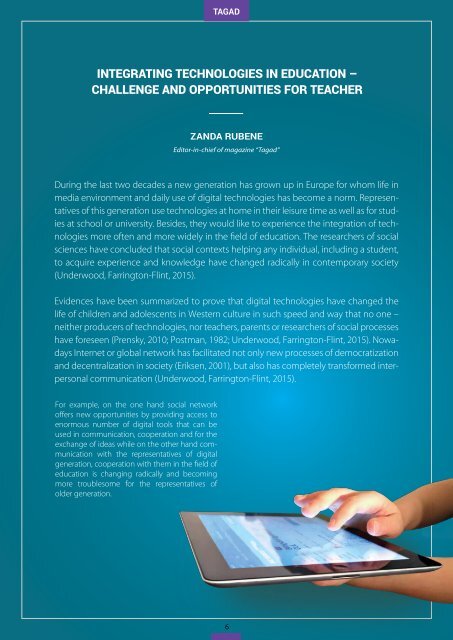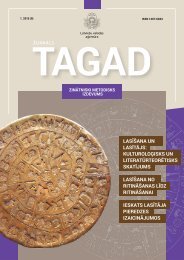Tagad 2016 (10)
Zinātniski metodiskais žurnāls "Tagad" 2016 '10 Interaktīvā tiešsaistes versija
Zinātniski metodiskais žurnāls "Tagad"
2016 '10
Interaktīvā tiešsaistes versija
You also want an ePaper? Increase the reach of your titles
YUMPU automatically turns print PDFs into web optimized ePapers that Google loves.
TAGAD<br />
INTEGRATING TECHNOLOGIES IN EDUCATION –<br />
CHALLENGE AND OPPORTUNITIES FOR TEACHER<br />
ZANDA RUBENE<br />
Editor-in-chief of magazine “<strong>Tagad</strong>”<br />
During the last two decades a new generation has grown up in Europe for whom life in<br />
media environment and daily use of digital technologies has become a norm. Representatives<br />
of this generation use technologies at home in their leisure time as well as for studies<br />
at school or university. Besides, they would like to experience the integration of technologies<br />
more often and more widely in the field of education. The researchers of social<br />
sciences have concluded that social contexts helping any individual, including a student,<br />
to acquire experience and knowledge have changed radically in contemporary society<br />
(Underwood, Farrington-Flint, 2015).<br />
Evidences have been summarized to prove that digital technologies have changed the<br />
life of children and adolescents in Western culture in such speed and way that no one –<br />
neither producers of technologies, nor teachers, parents or researchers of social processes<br />
have foreseen (Prensky, 20<strong>10</strong>; Postman, 1982; Underwood, Farrington-Flint, 2015). Nowadays<br />
Internet or global network has facilitated not only new processes of democratization<br />
and decentralization in society (Eriksen, 2001), but also has completely transformed interpersonal<br />
communication (Underwood, Farrington-Flint, 2015).<br />
For example, on the one hand social network<br />
offers new opportunities by providing access to<br />
enormous number of digital tools that can be<br />
used in communication, cooperation and for the<br />
exchange of ideas while on the other hand communication<br />
with the representatives of digital<br />
generation, cooperation with them in the field of<br />
education is changing radically and becoming<br />
more troublesome for the representatives of<br />
older generation.<br />
6



